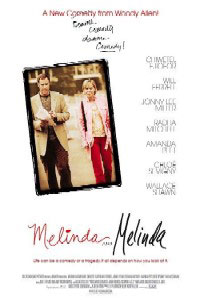Melinda and Melinda (PG-13) ★★★
 Legendary writer-director Woody Allen's work has suffered somewhat in his last few forgettable outings, but his latest effort, Melinda and Melinda, is a great step forward in returning to classic--or in this case, just-short-of-classic--form.
Legendary writer-director Woody Allen's work has suffered somewhat in his last few forgettable outings, but his latest effort, Melinda and Melinda, is a great step forward in returning to classic--or in this case, just-short-of-classic--form.
Story
Allen hasn't run out of fresh tweaks on his upscale New York stories: departing from films like Crimes and Misdemeanors, in which similarly themed tales intertwine as dramatic and lighthearted parallel plotlines, Melinda and Melinda tells the same story two different ways. One is tragic and one is comedic, each centering on a romantically troubled young woman named, of course, Melinda (played in both plots by Radha Mitchell), with storytelling dinner companions (including the always delightful Wallace Shawn) telling competing versions of her tale. In the serious interpretation, Park Avenue yuppie couple Laurel and Lee (Chloe Sevigny and Jonny Lee Miller) find their dinner party interrupted by their depressed, world-weary and possibly emotionally disturbed friend Melinda, who's reeling from a disastrous affair that sent her life into a tailspin. Her friends' efforts to help her recover and find love again ultimately threaten to cause fragile Melinda to unravel even further, even as they also radically upend their own lives. In the comedic variation, up-and-coming film director Susan (Amanda Peet) and her struggling actor husband Hobie (Will Ferrell) are host to a more winsome yet neurotic Melinda, whose rediscovery of romance befuddles the hopelessly smitten Hobie as he pines for her while plotting to painlessly end his unsatisfying marriage.
Acting
Allen smartly skips acting in this outing, avoiding any of those unpleasant May-December romances--Woody and Helen Hunt? Woody and Tea Leoni? Woody and Charlize Theron?--which gave a recurring ick factor to his recent works. Even better, he assembles an extremely talented ensemble of actors that breathe life into both the dark and light Manhattanite environs he creates. Mitchell is the best of the bunch, a genuine revelation in her ability to convincingly embody both Melindas: one a melancholy, emotional ghost of a woman and the other a charmingly kooky ingénue. Ferrell is also a standout, setting aside some of his broad-but-effective shtick to more fully inhabit the character that, in an earlier film, would have been Allen's role. Plus, Ferrell wisely avoids doing the kind of faux-Woody ticks that have tanked the performances of other Woody proxies (Kenneth Branagh and Jason Biggs among them) in recent Allen films. The rest of the ensemble is uniformly solid.
Directing
When Woody's writing is solid, his direction is always at its strongest and steadiest, and Melinda and Melinda is sound indeed. Easily his best work since 1999's Sweet and Lowdown, the film doesn't quite rise to the sidesplitting comedic heights of an Annie Hall and Hannah and Her Sisters or deliver the agonizing dramatic body blows of an Interiors, but it offers plenty of effective scenes evoking both hilarity and pathos. While the film is photographed beautifully by first-time Allen collaborator Vilmos Zsigmond (Life as a House), Allen eschews visual trickery in favor of focusing on character and dialogue, skillfully segueing between the parallel plotlines and only occasionally hitting cinematic speed bumps when it hops back to the framing sequence conceit.
Bottom Line
Although Melinda and Melinda doesn't quite have the same resonance as some of Allen's seriocomic masterpieces, it's definitely a worthy, entertaining and thought-provoking entry into his specific cinematic canon of urbane sophistication.
To get the full Quicklook Films experience, uncheck "Enable on this Site" from Adblock Plus
box office top 10

Civil War Released: April 12, 2024 Cast: Kirsten Dunst, Wagner Moura 25.7M

Godzilla x Kong: The New Empire Released: March 29, 2024 Cast: Rebecca Hall, Brian Tyree Henry 15.5M

Ghostbusters: Frozen Empire Released: March 22, 2024 Cast: Paul Rudd, Carrie Coon 5.8M

Kung Fu Panda 4 Released: March 8, 2024 Cast: Jack Black, Viola Davis 5.5M

Dune: Part Two Released: March 1, 2024 Cast: Timothée Chalamet, Rebecca Ferguson 4.3M

Monkey Man Released: April 5, 2024 Cast: Dev Patel, Sikandar Kher 4.1M

The First Omen Released: April 5, 2024 Cast: Nell Tiger Free, Bill Nighy 3.8M

The Long Game Released: April 12, 2024 Cast: Dennis Quaid, Gillian Vigman 1.4M

Shrek 2 Released: May 19, 2004 Cast: Mike Myers, Eddie Murphy 1.4M

Sting Released: April 12, 2024 Cast: Alyla Browne, Ryan Corr 1.2M






